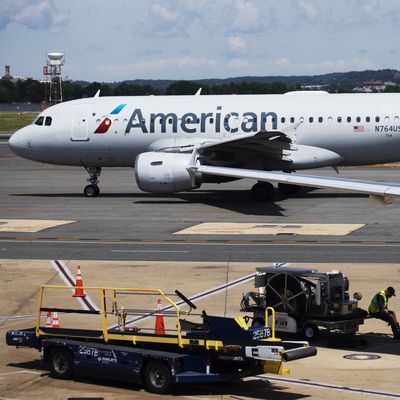
Widespread worker shortages are making their presence felt across the American economy, and some air travelers are feeling the brunt of that. On the latest Pivot podcast, Kara Swisher and Scott Galloway discuss the case of American Airlines, which, despite a federal bailout, finds itself in a similar situation as many other businesses.
Subscribe on:
Kara Swisher: There’s trouble for travel. American Airlines is canceling hundreds of flights throughout July, mostly due to staffing issues. This time at the height of the pandemic, the company furloughed thousands of workers. Meanwhile, American Airlines CEO Doug Parker made over $10 million in compensation during the same time period. And they all got a lot of Cares Act money, etc., etc. And now employees don’t want to come back to work. So what do you think? What do you think of what’s happened here?
Scott Galloway: Well, I think it’s more of the same. What’s shocking isn’t that workers aren’t coming back. What’s shocking is that people making $10 million a year are shocked that people don’t want to come back to work at 15 bucks an hour.
Swisher: Yeah.
Galloway: So it’s nice that there is some truth to the fact that the market is the ultimate arbiter and the fact that the market does seem to be finally bringing up the wages of front-line workers or people at lower income levels. But look, I’m not a big fan of bailing out companies, small or big. I think we need to be more harsh with companies. Airlines would still be flying if they’d all gone bankrupt. To be fair, a lot of them, including Delta and Southwest, opted to get loans in the private markets. I think American and United opted to take loans from the government.
But look, if you go back to long-term capital management, if you go back to the initial bailout of Chrysler, all bailouts do is set up for bigger bailouts. And when you’re bailing out a company, the CEO will try to position it as saving jobs and saving America. And really what they’re doing is they’re saving their own compensation, because the stock goes way down, they get awarded options, and then when stock comes back up, they make $10 million. But when we bail out companies, who we’re really bailing out is the one percent.
Swisher: You’ve said this a lot, yeah.
Galloway: If you look at the S&P 500 and you disarticulate it into deciles and you take the biggest 50 companies and you keep going down, there’s now a correlation between size and returns. And the reason why is that the market, which is smarter than all of us, absorbs the notion that there’s a symmetric risk return to the upside. Because if you’re too big to fail, the government comes in and says, “Okay, take big risks. And if they work, boom, you make money. And if they don’t work, we’ll bail you out.” And all we’re really doing with these bailouts at the end of the day is bailing out shareholders, which by gross dollar amount, 90 percent goes to the top one percent. So all of these bailouts, they shouldn’t be called bailouts. They should be called, “We’re making the rich richer. We’re making the shareholder class richer.”
Swisher: So what should they have done here? This was an extended period of non-travel, and the business fell. Other companies laid people off — Airbnb did this. Many others did. How do you get people back to work if they don’t want to work? And this, of course, is the Republican calling cry. I was in a supermarket the other day, a very good supermarket. I’m in Rhode Island right now. And they couldn’t do the deli counter because they didn’t have enough workers, right? And so I asked someone and they were like, “It is because why come back to work if you’re going to earn less?”
But the minute that employment benefits end, they’re going to go back to work. But they’re going to pick the jobs, they’re going to try to get a better job or a better deal. And some of these companies, which have been riding off the backs of workers for a while, are going to have a real problem. And in American Airlines’ case, they laid off a lot of people and the contrast — while it’s more complex than just, oh, a CEO gets money and workers get furloughed — is really going to challenge employers to do better for employees, presumably.
Galloway: There’s a few components to this. And you summarized the first component perfectly. And that is, if a company — a small business or Uber, whoever it is — can’t survive without software that circumvents minimum-wage laws or without an employment contract that pays people $2 an hour plus tips, that business should go out of business. We don’t need businesses like that. That’s bad for the economy. We can also raise the minimum wage.
But I’m a big believer that you should be able to fire workers. The countries that have the easiest time firing workers are the countries that hire workers at the greatest clip when the economy comes back. You should also let businesses fail. They go out of business. And when they go out of business … everyone imagines that no one would get to fly again if Delta went out of business. No. The creditors would come in, take over the company. The shareholders would be wiped out. Senior management wouldn’t make as much money. A lot of people would be fired in the short run, and then someone else with fresh capital and fresh legs and a fresh vision for a post-pandemic airline would come back.
Swisher: This is something that Chamath Palihapitiya said to me, is that things should just die. Chamath can be very …
Galloway: Or be reinvented.
Swisher: Yeah. That’s what he was talking about. And those that are not investing in growth are going to be in trouble. This was in the middle, right as the pandemic started. He said, “Any company that is giving dividends or overpaying its CEOs is in big trouble after the pandemic.”
Galloway: Well, one of the things that makes America great is that we believe in pyrophilic plants. And those are plants that are only borne of termination by fire, and fire is rejuvenating. And what happens is when you keep bailing out these companies, all you’re doing, Kara, is letting more brush and accelerant gather such that when the actual crash comes, it is a firestorm.
Swisher: Yeah.
Galloway: You let businesses go out of business. And guess what? If Carnival was allowed to go out of business or American was allowed to go out of business, there would still be an airline. People would still get from point A to point B. People would be hired back. And in terms of employees, I just find it shocking that everyone looks at this as an existential crisis. It’s not that people don’t want jobs. People have said, “You know what? I don’t want a shitty job. I’m sick of getting paid no money.”
Swisher: They’ve had an assessment. They’ve realized the trade-off they’ve been doing and what they’ve been putting up with.
Pivot is produced by Rebecca Sananes.
This transcript has been edited for length and clarity.





























